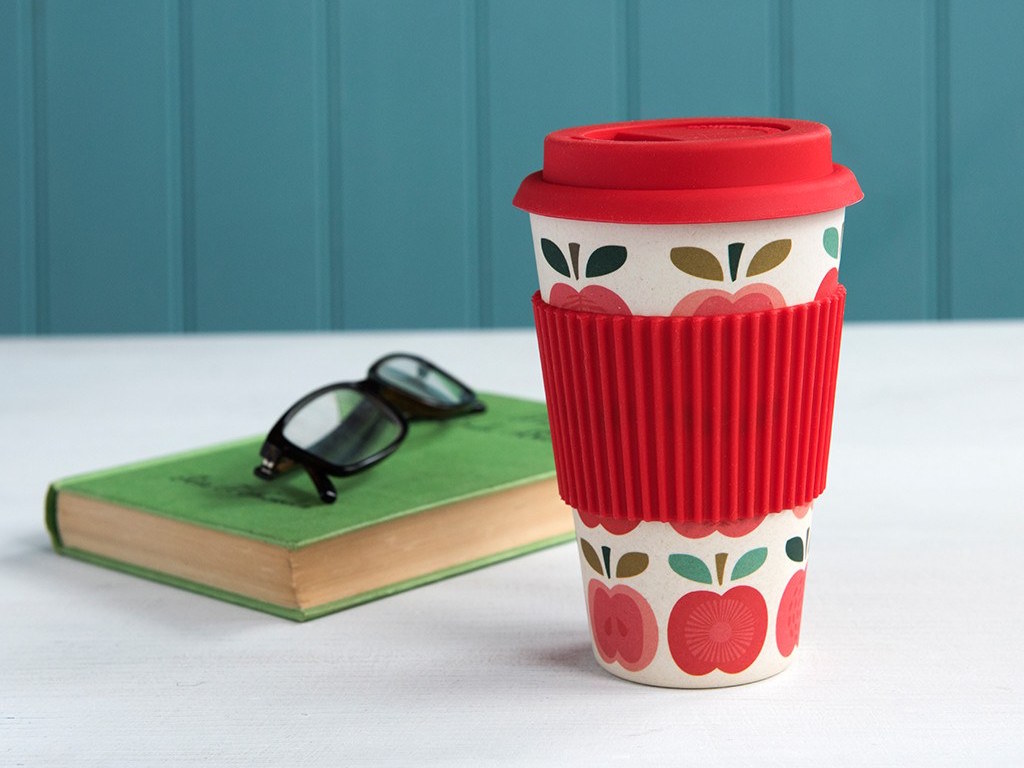4 Mins Read
12 Popular Reusable Bamboo Fibre Coffee Cup Brands Found To Contain Toxic Melamine
Looks like another popular zero waste accessory may bite the dust. That reusable bamboo fibre coffee cup that everyone is using and has become ubiquitous on the shelves of retail shops, independent cafés, coffee chains and your local homeware store? Turns out it may contain some pretty harmful chemicals. New research conducted by German consumer group Stiftung Warentest found that they all contain melamine resin, a problematic substance from a health AND environmental perspective.
The bamboo cup has become, in recent years, the much applauded replacement to the 16 billion disposable coffee cups, most of which are coated with plastic laminate, and feature plastic lids, thrown away each year Earth Day. But the popular alternative, the reusable bamboo fibre coffee cup, might not be as eco-friendly as you think.
All 12 of the bamboo cups tested by the consumer group contained melamine resin, an environmentally-problematic substance linked to numerous health problems.
Turns out, despite being presented to consumers as ecological and biodegradable, most bamboo fibre cups contain melamine resin. An investigation by German consumer organisation Stiftung Warentest tested 12 different popular bamboo fibre cup brands and found melamine resin present in every sample. Melamine resin is a type of plastic glue made from a mix of melamine and formaldehyde. While melamine has been linked to causing damage to our livers and kidneys, formaldehyde is a proven irritant and has even been associated with cancer when inhaled.
While these substances have been connected to a number of health concerns, worryingly, as long as certain conditions are met, producers are still allowed to manufacture and sell these products. For instance, the Hong Kong Government’s Centre for Food Safety recommends that melamine-ware should only be used to serve food from 30 to 120 degrees Celsius, and should never be used for cooking, in an oven or a microwave. Worse, a great deal of melamine-ware is used to created children’s eating products, such as bowls, plates and cups.
Melamine and formaldehyde have both been found to leach into food and liquids heated to 70+ degrees celsius.
The minimal regulations on melamine-ware are failing consumers, given that melamine resin has been shown to leach into food at temperatures as low as 70 degrees Celsius. A 2006 Danish study revealed that after 2 hours at 70 degrees Celsius, melamine and formaldehyde had migrated into food. In 2013, a group of Taiwanese research institutes found that participants consuming hot food in melamine-ware, for example, eating a bowl of noodle soup, showed traces of the glue in their urine.
Bamboo fibre cups containing melamine resin are marketed for hot drinks well above 70 degrees celsius. Stiftung Warentest’s own findings indicated that bamboo cups contained “high” levels of melamine after only the third filling of hot liquid and significant levels of formaldehyde too. There’s more bad news: these harmful chemicals do not evaporate, but persist and continue to seep into drinks in higher levels with prolonged use.
“Not only do the cups contain toxic melamine, they are mis-advertised as biodegradable, when in fact they do not break down.“
Biodegradable? Recyclable? Total Greenwashing.
In addition to posing a health risk, bamboo fibre cups are also misleadingly labelled as “biodegradable” or easily “recyclable”. Natural bamboo plant fibres will biodegrade over time, but the cups – mixed with melamine resin in order to hold their shape – will not rot.
Far from being easily recyclable either, the lack of sufficient waste management infrastructure in many countries means that the typical end-of-life for these cups is to be burned, and what’s worse, the process of burning releases greenhouse gases (and toxic chemicals) that contribute to ever-rising global temperature extremes and other adverse effects due to climate change.
Greenwashing is already a big problem, and makes life as a conscious consumer more difficult. Simply pit, it can be hard to know what brands to trust and what products to choose. Brands are not necessarily trying to be misleading, but due to lack of proper due diligence and lack of adequate lifecycle analysis (such as properly vetting manufacturing inputs and understanding what happens to products once they are disposed), and the surge of ‘halo branding’ tactics, many of them get caught with their pants down.
Recently, testing conducted by The New Food Economy discovered that supposedly green moulded fibre bowls used by chains Chipotle & Sweatgreen and advertised as compostable contain PFAS or “forever chemicals” that leach into soil when composted, making them dangerous for human health and the planet.
How To Avoid Toxic Bamboo Fibre – Consumer Guide
- Pay close attention to anything advertised as made from bamboo fibre. If it’s made from actual pieces of bamboo, you should be fine, but if it’s bamboo fibre, you will need to do more checking.
- Check product labels to make sure they say melamine-free. A properly eco brand worth its (plastic-free Himalayan) salt will be transparent about not using melamine.
- Be vigilant about where products come from and how they are made. As consumers, we can vote with our dollar by supporting brands who go the extra (eco) mile.
- Be especially vigilant when buying items that will be used by children.
- If you can’t be sure, stick to reusable cups/containers/products made from glass and metal (BPA-free!).
Lead image courtesy of Rex London.




